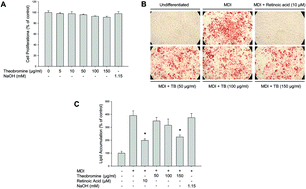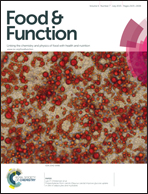Theobromine inhibits differentiation of 3T3-L1 cells during the early stage of adipogenesis via AMPK and MAPK signaling pathways
Abstract
Obesity is characterized by hypertrophy and/or by the differentiation or adipogenesis of pre-existing adipocytes. In this study, we investigated the inhibitory effects of theobromine, a type of alkaloid in cocoa, on adipocyte differentiation of 3T3-L1 preadipocytes and its mechanisms of action. Theobromine inhibited the accumulation of lipid droplets, the expression of PPARγ and C/EBPα, and the mRNA expression of aP2 and leptin. The inhibition of adipogenic differentiation by theobromine occurred primarily in the early stages of differentiation. In addition, theobromine arrested the cell cycle at the G0/G1 phase and regulated the expressions of CDK2, p27, and p21. Theobromine treatment increased AMPK phosphorylation and knockdown of AMPKα1/α2 prevented the ability of theobromine to inhibit PPARγ expression in the differentiating 3T3-L1 cells. Theobromine reduced the phosphorylation of ERK and JNK. Moreover, the secretion and the mRNA level of TNF-α and IL-6 were inhibited by theobromine treatment. These data suggest that theobromine inhibits adipocyte differentiation during the early stages of adipogenesis by regulating the expression of PPARγ and C/EBPα through the AMPK and ERK/JNK signaling pathways in 3T3-L1 preadipocytes.


 Please wait while we load your content...
Please wait while we load your content...